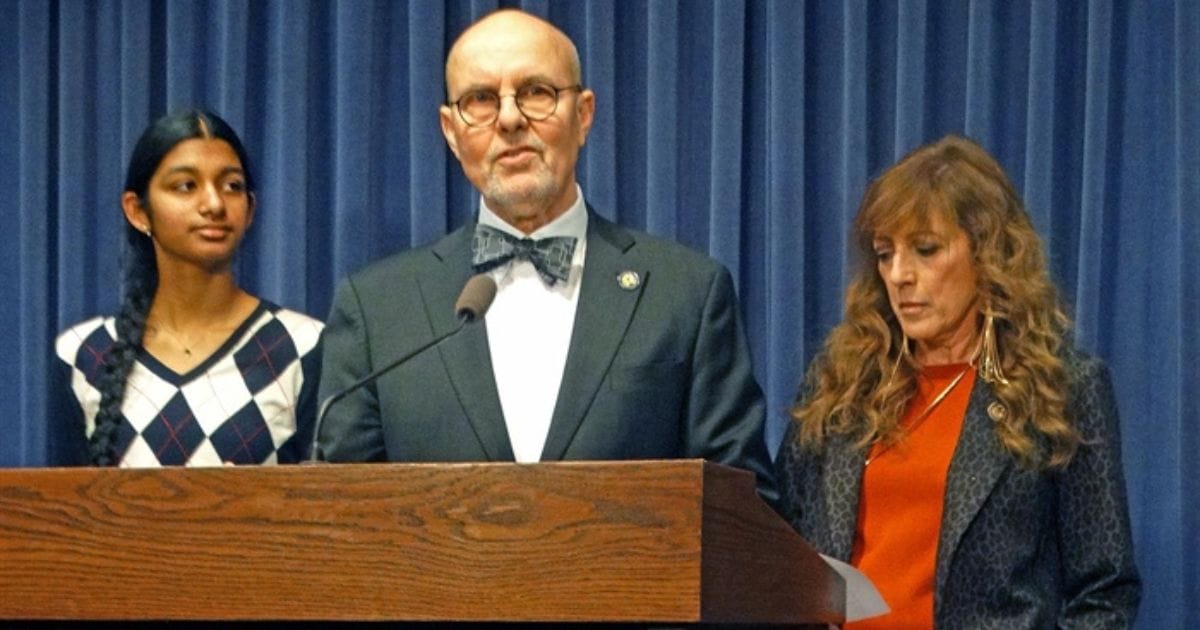Photo caption: Democratic state Sens. Dave Koehler, center, and Linda Holmes discuss a bill they are pushing to make sure children who appear in their parents’ revenue-generating videos receive a share of the those revenues. It is an idea brought to them by a high school student from Normal, Shreya Nallamothu, left. (Capitol News Illinois photo by Peter Hancock)
Parents who make money posting videos of their children on social media channels may soon be legally required to share that revenue with their kids.
The Illinois Senate Labor Committee this week unanimously approved a bill that would guarantee children a right to a percentage of that revenue if the videos meet certain criteria.
“Parents should not be able to profit from the work of their children,” state Sen. Linda Holmes, D-Aurora, a cosponsor of the bill, said during a Wednesday news conference. “It’s no different than kid television stars having protections. We must ensure that kids are accurately compensated for their work.”
Bill sponsor state Sen. David Koehler, D-Peoria, compared it to California’s 1938 “Coogan Law” – named after the child silent film star Jackie Coogan – that first protected the income of child actors in Hollywood.
But Koehler said no such law exists to protect children whose parents make them the subject of social media videos, and if the bill passes, Illinois would become the first state to do so.
“I didn’t realize how big of an issue this is. This is a huge issue,” he said. “And we’re getting national attention on this.”
The act of parents sharing photos or videos of their children on platforms like Facebook, YouTube and Instagram is not new. But some parents have turned it into a cottage industry by launching a video blog, or vlog, that generates revenue through advertising, product placements and subscription fees.
People who engage in that business are sometimes referred to as “influencers.” That comes from the business practice of endorsing specific products or services in an attempt to influence others to purchase them.
Koehler and Holmes said they got the idea from a 15-year-old student, Shreya Nallamothu, of Normal, who said she began looking into it as part of an independent studies project at her high school.
“When you’re scrolling online, do you ever see videos of children or families vlogging every aspect of their life?” She asked. “Most of the time when kids are featured on the internet, it’s often wholesome content with no ill intentions. But unfortunately, with the rise of social media, we’re starting to see the rise of something called child influencers, and child influencers are essentially kids who are forced to be featured in videos by their parents to rake in more views and more money.”
Senate Bill 1782 would put children who are featured in vlogs under the protection of the Illinois Child Labor Law.
It provides that if a child under age 16 is depicted in 30 percent or more of a vlogger’s content within a 30-day period and the videos generate compensation, then the child is entitled to a proportionate share of that revenue. In other words, if the child is depicted or discussed in 30 percent of the content, then the child would be entitled to 30 percent of the revenue.
If more than one child is depicted and they all meet the threshold for being compensated, they would split their share of the revenue evenly.
That money would have to be set aside in a trust fund that the child or children can access when they turn 18.
In addition, once the child turns 18, he or she can request the online platform to remove any content in which they are depicted.
“Because a lot of kids are, quite frankly, videoed and it’s really funny,” Koehler said. “But when they’re, you know, 20 years old they may not think it’s so funny.”
Although the bill passed out of the Labor Committee, Koehler said he plans to bring an amendment to clarify aspects of the bill before it’s considered by the full Senate.
Capitol News Illinois is a nonprofit, nonpartisan news service covering state government. It is distributed to more than 400 newspapers statewide, as well as hundreds of radio and TV stations. It is funded primarily by the Illinois Press Foundation and the Robert R. McCormick Foundation.
This article originally appeared on Capitol News Illinois.






